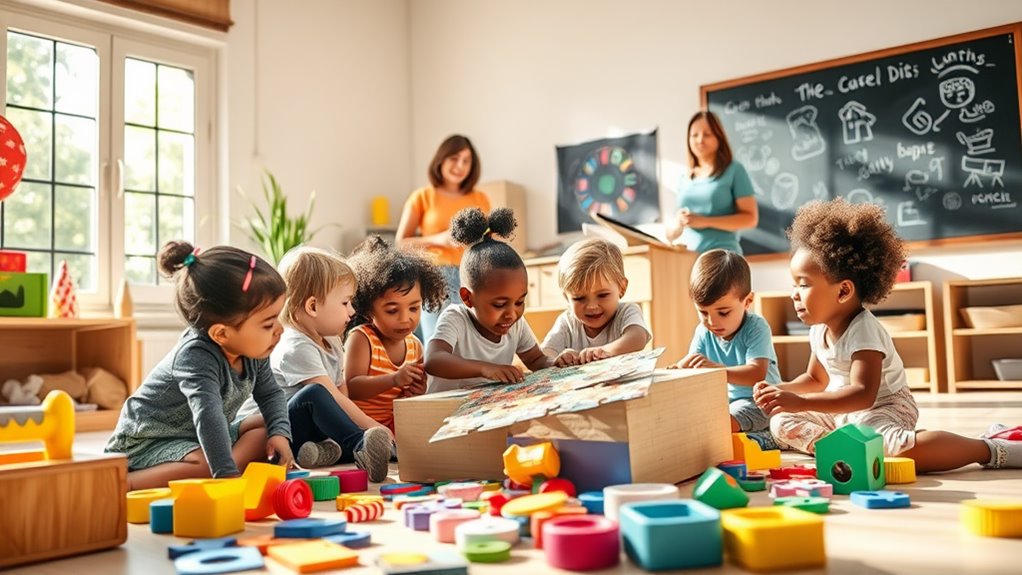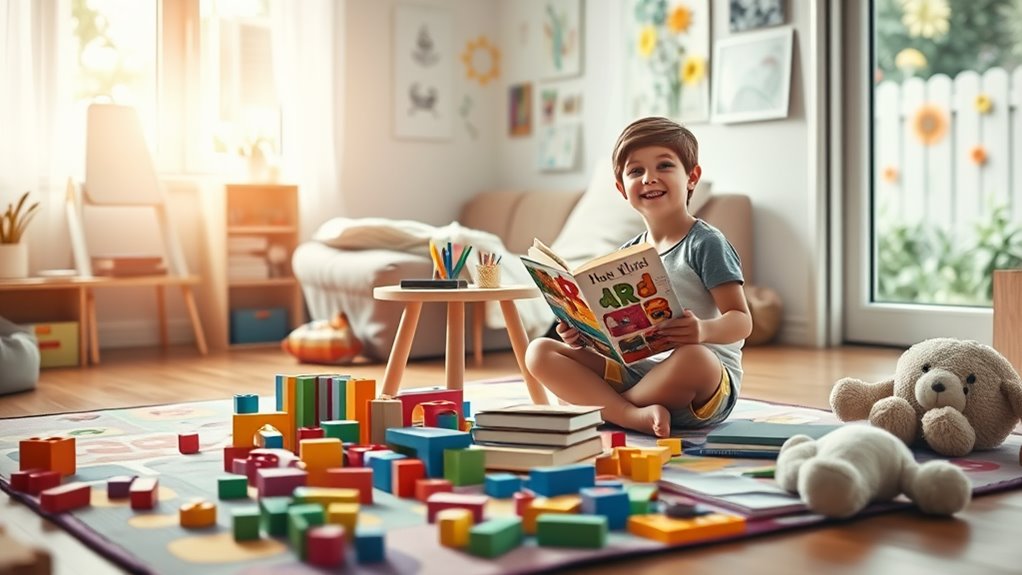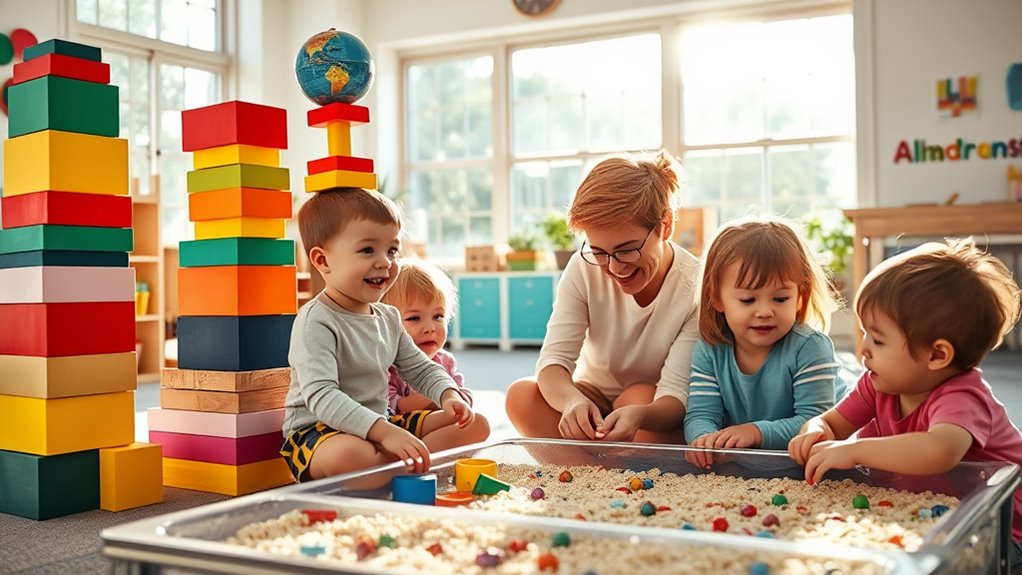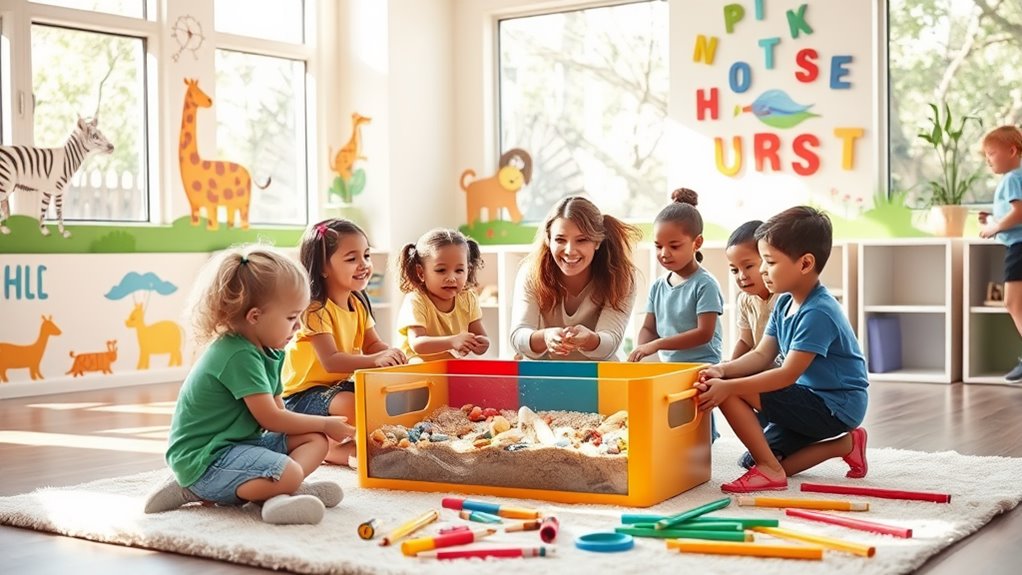Early Childhood Education Myths You Need to Stop Believing!
You’ve probably heard many myths about early childhood education that can hold your child back. For instance, playtime is essential—not just a fun distraction—as it encourages creativity and problem-solving. Also, early academics aren’t necessary for success; fostering social skills and emotional intelligence is crucial. It’s important to note that children learn everywhere, not just in school. Each child is unique, so one approach doesn’t fit all. Lastly, parental involvement is vital for growth. By understanding these myths, you can better support your child’s development and pave the way for their future. There’s plenty more to explore on this topic!
Key Takeaways
- Myth: Early academics ensure future success – Focus on play-based learning enhances creativity and social-emotional skills, which are better predictors of long-term success.
- Myth: Playtime is a waste of time – Play is essential for cognitive development, problem-solving, and social skills, laying a foundation for academic success.
- Myth: All screen time is harmful – High-quality educational content can promote cognitive development and critical thinking skills when used appropriately and co-viewed with caregivers.
- Myth: Children should reach milestones at the same pace – Every child develops uniquely; forcing early learning can cause anxiety and hinder natural growth.
- Myth: Parental involvement doesn’t matter – Active parental engagement significantly boosts children’s academic performance and fosters better social interactions in school settings.
Myth: Playtime Is Just Fun
When you think about playtime, it might seem like just a chance for kids to have fun, but it’s so much more than that. Playtime serves as a vital avenue for creative expression, allowing children to explore their imaginations without the constraints of structured learning. Through unstructured play, kids engage in storytelling, role-playing, and artistic activities, fostering their ability to think outside the box and solve problems creatively.
Additionally, playtime is essential for developing social skills. As children interact with their peers, they learn how to communicate, negotiate, and collaborate. These interactions help them understand different perspectives, manage emotions, and build empathy. Whether it’s sharing toys or resolving conflicts, each play session equips them with the tools to navigate social situations effectively.
Myth: Early Academics Are Essential
Many believe that pushing early academics is crucial for your child’s success, but that’s not the whole story. Prioritizing play-based learning and understanding your child’s developmental readiness can lead to more meaningful growth. In fact, focusing on these factors often lays a stronger foundation for long-term success.
Importance of Play-Based Learning
In early childhood education, the importance of play-based learning often gets overshadowed by the misconception that early academics are essential for success. However, play is a powerful vehicle for fostering cognitive development and social interaction among young children. When kids engage in play, they’re not just having fun; they’re exploring concepts, solving problems, and developing critical thinking skills.
Through play, children learn to navigate social dynamics, negotiate rules, and collaborate with peers. This interaction enhances their social skills, promoting empathy and communication. You’ll find that when children are allowed to play, they naturally build the foundational skills they need for later academic success without the stress of formal instruction.
Moreover, play-based learning encourages creativity and curiosity, which are vital for lifelong learning. Instead of focusing solely on early academics, you should embrace the rich opportunities that play provides. By doing so, you’re not only supporting children’s cognitive growth but also nurturing their emotional and social well-being. Ultimately, prioritizing play in early childhood education lays a sturdy groundwork for success, making it clear that learning through play is not just beneficial—it’s essential.
Developmental Readiness Matters
Understanding the concept of developmental readiness is key to dispelling the myth that early academics are crucial for success. Children develop at their own pace, reaching specific developmental milestones that signal when they’re ready for more structured learning. Forcing academic skills before a child is developmentally ready can lead to frustration and anxiety, rather than enthusiasm for learning.
Focusing on age appropriateness is essential. Each child’s readiness for tasks like reading or math varies widely, depending on their unique growth patterns. Engaging in play, exploration, and social interaction during early years lays a strong foundation for future academic success. These experiences foster critical thinking, problem-solving skills, and emotional intelligence—all vital components of learning.
When you prioritize developmental readiness over academic pressure, you’re nurturing a love for learning that lasts a lifetime. Remember, the aim isn’t to rush into formal education but to support your child in reaching their milestones confidently. By letting them grow at their own pace, you’ll help ensure that they’re truly ready to thrive in their educational journey, setting the stage for long-term success. Embrace this natural development; it’s the best choice for your child’s future.
Long-Term Success Factors
The belief that early academics are essential for long-term success can be misleading. While it’s tempting to think that introducing formal learning at a young age guarantees better long-term outcomes, research shows that this isn’t necessarily true. In fact, social-emotional skills, creativity, and problem-solving abilities often serve as stronger success indicators as children grow.
Focusing too heavily on early academics can stifle a child’s natural curiosity and love for learning. Instead of pushing for academic milestones, consider fostering an environment that emphasizes play-based learning. This approach not only supports cognitive development but also builds resilience and adaptability—critical traits for future success.
As you navigate early childhood education, remember that holistic development outweighs academic pressure. Encourage exploration, collaboration, and self-expression. These experiences cultivate essential skills that will benefit your child well beyond their early years.
Ultimately, the key to long-term success lies in nurturing a balanced, supportive environment that prioritizes emotional well-being alongside cognitive growth. By dismissing the myth that early academics are essential, you empower your child to thrive in their own unique way.
Myth: Children Learn Only in School
Believing that children learn only in school limits their understanding of the world around them. In reality, much of a child’s learning occurs outside the classroom through informal learning experiences. These moments—playing in the park, helping in the kitchen, or interacting with peers—contribute significantly to their development.
School experiences are essential, but they represent just one piece of the learning puzzle. Children absorb knowledge continuously, developing critical thinking, problem-solving skills, and social awareness through everyday interactions. For instance, when your child negotiates playtime rules with friends, they’re practicing communication and conflict resolution, skills that are vital in school and life.
Encouraging informal learning opportunities can enhance your child’s education. Take them to museums, involve them in community activities, or simply engage in meaningful conversations at home. These experiences foster curiosity and a lifelong love of learning.
Myth: One Size Fits All
Many parents assume that a one-size-fits-all approach to education works for every child, but that couldn’t be further from the truth. Each child is unique, and their individual learning styles and needs demand personalized approaches. Understanding this is essential for fostering a love of learning.
Here are four key reasons why a tailored approach is crucial:
- Different Learning Styles: Children absorb information differently; some may thrive with visual aids, while others excel through hands-on experiences.
- Pacing Matters: Each child progresses at their own speed. Some may need more time to grasp concepts, while others might be ready to advance quickly.
- Interests Drive Engagement: When education aligns with a child’s passions, it ignites curiosity and motivation, enhancing retention and understanding.
- Social and Emotional Needs: Every child has distinct social and emotional development, which influences their learning environment and peer interactions.
Embracing these individualized strategies not only supports academic growth but also nurtures a child’s overall development. By recognizing that one size doesn’t fit all, you can provide the foundation for lifelong learning that meets your child’s unique needs.
Myth: Parents Aren’t Important
You might think that teachers do all the heavy lifting in early childhood education, but parents play a crucial role in their child’s development. The home learning environment you create can significantly influence your child’s growth, while your strong connections with schools foster a supportive learning journey. Let’s explore why your involvement is vital for your child’s success.
Role in Development
The impact of parental involvement on a child’s development is profound and undeniable. You play a crucial role in shaping your child’s cognitive growth and social skills. Contrary to the myth that parents aren’t important, your engagement can significantly influence various aspects of their early learning journey. Here are four ways your involvement makes a difference:
- Emotional Support: Providing a secure emotional base helps children feel safe, allowing them to explore and learn confidently.
- Learning Through Play: Engaging in playful activities with your child fosters creativity and problem-solving, essential for cognitive development.
- Modeling Behavior: Children learn by observing you. Your actions and interactions serve as a blueprint for their own social skills.
- Encouraging Exploration: When you encourage curiosity and exploration, you lay the groundwork for critical thinking and resilience.
Home Learning Environment
A nurturing home learning environment plays a crucial role in a child’s educational success, debunking the myth that parents aren’t important. Your involvement in your child’s early years shapes their cognitive and emotional development. By creating a positive home environment, you’re laying the foundation for lifelong learning.
Utilizing everyday moments as learning opportunities can be incredibly beneficial. Whether it’s reading together, engaging in conversations, or exploring the outdoors, these experiences enrich your child’s understanding of the world. Providing various learning resources—like books, puzzles, and art supplies—also encourages curiosity and creativity.
It’s essential to recognize that your interactions matter. When you show enthusiasm for learning, your child is more likely to mirror that excitement. Remember, it’s not about formal lessons but fostering an atmosphere where questions are welcomed and exploration is encouraged.
In essence, your role as a parent or caregiver goes beyond basic support; you’re an integral part of your child’s educational journey. By actively participating in their learning, you help them develop essential skills that will benefit them in school and beyond. Embrace this opportunity, and watch your child thrive!
Stronger School Connections
Often overlooked, the connection between parents and schools significantly impacts a child’s educational experience. When you engage in school partnerships, you not only support your child but also foster a community of learning that benefits everyone involved. Here’s why your involvement matters:
-
Improved Academic Performance: Studies show that children whose parents are actively involved in their education often achieve higher grades and test scores.
-
Enhanced Social Skills: Your participation helps children develop better social skills, as they see you collaborating with teachers and peers in the school environment.
-
Stronger Community Ties: By getting involved, you contribute to building a more connected community that values education, encouraging others to do the same.
-
Increased Motivation: When you take an active role, your child feels more motivated and supported, knowing you care about their learning journey.
Don’t underestimate the power of family engagement. Your involvement can transform school experiences for your child and help create a thriving educational community. Embrace the opportunity to connect, and watch how it positively influences your child’s growth.
Myth: Screen Time Is Always Bad
In today’s digital age, many parents worry that screen time is inherently harmful for young children. However, this myth overlooks the potential benefits of engaging, high-quality educational content. When used judiciously, screen time can actually support cognitive development and enhance learning experiences.
Consider the wealth of interactive apps and programs designed specifically for young learners. These tools can foster critical thinking, problem-solving, and creativity. They often provide opportunities for exploration and discovery that traditional play might not offer. Moreover, shared screen time with caregivers can strengthen bonds and promote discussions, turning passive viewing into an interactive learning experience.
It’s essential to recognize that not all screen time is created equal. The key lies in selecting age-appropriate, educational content and setting reasonable limits. Instead of viewing screens solely as distractions, think of them as one of many tools in your child’s learning toolbox. By embracing a balanced approach, you can harness the positive aspects of screen time while mitigating its risks. Remember, it’s not about eliminating screen time entirely, but rather about curating meaningful experiences that contribute to your child’s cognitive development.
Frequently Asked Questions
How Can I Support My Child’s Learning at Home?
To support your child’s learning at home, establish consistent reading routines and engage them in creative activities. These practices foster curiosity, enhance comprehension, and make learning enjoyable, helping your child thrive academically and socially.
What Role Does Social Interaction Play in Early Education?
Social interaction’s crucial in early education. When kids build peer relationships, they engage in collaborative learning, enhancing critical thinking and problem-solving skills. You’ll notice their confidence growing as they navigate friendships and group activities together.
Are There Benefits to Unstructured Playtime?
Absolutely! Unstructured playtime boosts unstructured creativity and fosters cognitive development. It lets you explore, experiment, and learn problem-solving skills, all while encouraging independence. Embrace this time; it’s crucial for growing young minds!
How Do Different Learning Styles Affect Education?
You might think one teaching style fits all, but it doesn’t. Recognizing visual, auditory, and kinesthetic learners allows you to apply differentiated instruction. Embracing multiple intelligences enhances engagement, catering to individual learning preferences effectively.
What Is the Impact of Parental Involvement on Child Development?
Parental involvement significantly enhances child outcomes. When you actively engage in your child’s life, you foster emotional security and cognitive growth, leading to better academic performance and social skills. Your support truly makes a lasting difference.




